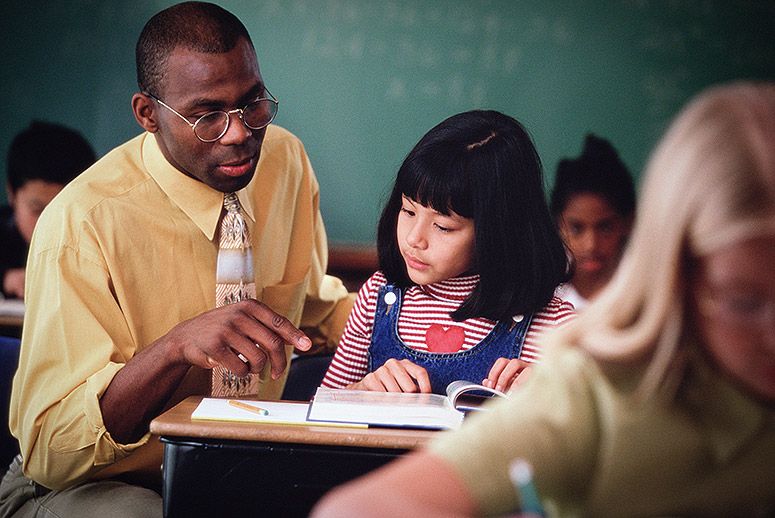Viewing education as a calling more than a career, they make up a fraction of the overall workforce yet gravitate toward the schools that need them most. It’s not unusual for them to wear multiple hats, sometimes at once: teacher, advocate, social worker, role model.
A new survey finds, however, that when it comes to policy meetings in the school staff room, black teachers in the United States feel left out of the discussion—despite hands-on, ground-level experience in the toughest classrooms.
Moreover, at a time when diversifying the workforce is on the national education to-do list, black teachers often believe they’re stereotyped as only able to teach minority students, and school administrators view them as classroom disciplinarians more than as educators.
“The Black teachers we spoke with were frustrated,” according to the report, Through Our Eyes: Perspectives and Reflections From Black Teachers, which was produced by The Education Trust, a nonprofit policy center. “They remain teachers, they say, because they love their students, their work, and want to be able to fully contribute to the educational success of their kids.”
Though they make up roughly 7 percent of the U.S. teacher workforce, black teachers are leaving the profession at an alarming rate. A 2005 study from the University of Pennsylvania revealed that teachers of color bailed out of the profession 24 percent more often than white teachers.
“We become the representative for every child of color, I mean, whether we relate to them, whether our culture is the same or not,” one teacher told The Education Trust researchers. “We become the representative for all of those children.”
But Leslie T. Fenwick, former dean of Howard University’s School of Education, told TakePart
the survey is a symptom of a much larger problem: little to no diversity among people who set local and district-level education policies—or in the institutions that train most of the nation’s teachers.
“If you don’t have people of color represented in leadership positions, or people who as [teaching] professionals served in these urban contexts represented in leadership positions, it results in a dissonance” between administrators and teachers of color, Fenwick said.
That in turn exacerbates the gap between how black teachers are prepared for the classroom, the assignments they get, and the support and training they need to thrive, she said.
“This is the group of teachers who, from the time they are in training, say they want to stay in urban, high-poverty settings,” Fenwick said.
A recent study by the Albert Shanker Institute found that the number of black educators has declined sharply in some of the nation’s largest urban school districts.
In Chicago, for example, the black teacher population dropped by nearly 40 percent between 2001 and 2012; researchers found similar trends in Philadelphia (18.5 percent) and in New Orleans (62 percent).
Part of the drop can be attributed to the closing or consolidation of underperforming, majority-minority schools. But Fenwick and others say it’s part of a leaky pipeline for black teachers, even as minorities outnumber whites in the nation’s public schools.
In its survey, The Education Trust convened a focus group of 150 black teachers around the nation, targeting “states and districts with high numbers of teachers of color” and finding participants through schools and related organizations.
“As we traveled, a distinct narrative began to unfold,” according to the report, coauthored by Education Trust researchers Ashley Griffin and Hilary Tackie. Teachers were passionate, felt called to teach, and had high expectations for their students, but “the same qualities that they (and others) perceived as strengths…often hindered their professional growth.”
The researchers wrote that they interviewed educators “who had a penchant for teaching and serving Black students well, but found themselves restricted to only teaching Black students” and “were limited to acting as disciplinarians instead of being respected for their ability to manage their classrooms.” These educators “put in extra time and effort, but still weren’t heard in staff meetings,” and although they related well to their students, they “had to ‘tone down’ their personalities to be seen as professionals.”
Further, “they reported being pigeonholed by peers, parents, and administrators into specific roles based on these strengths, thereby limiting and diminishing their capabilities,” wrote the authors. “Without the acknowledgment of (or the chance to build) the pedagogical and subject matter expertise essential to their profession, they felt they lacked opportunities for advancement and were undervalued and unappreciated.”
While the report recommends “honest and critical examinations of school cultures and systemic processes” that lead to these frustrations, Fenwick said change is necessary throughout the profession.
She pointed out that most of the nation’s black teachers are trained at a small number of historically black colleges and universities, which help prepare teachers for the frustrations they find on the job. By contrast, she said, the traditionally white schools that train the bulk of the nation’s educators—including administrators—typically treat race, diversity, and inclusion issues as an afterthought.
That’s a problem, Fenwick said, when only about 11 percent of the nation’s roughly 94,000 school principals are black and less than 3 percent of public school superintendents are black. Retaining black teachers is critical, she said, because “we lose sight of the fact that 71 percent of inner-city teachers are white and 68 percent of inner-city principals are white.”
“Teacher diversity is critically important. And contrary to conventional wisdom, it’s not just Black students who benefit from having Black teachers in their classroom. Indeed, research shows that students from all races benefit from being taught by an educator of color,” Griffin said in a statement. “The unfiltered perspectives shared in this project provide evidence exposing the racial bias in schools and school systems across the nation. These conditions impact not only Black teachers, but all the students they serve.”
A veteran journalist and former White House correspondent for Politico, Joseph Williams is a freelance writer, blogger, and essayist in Washington, D.C.





